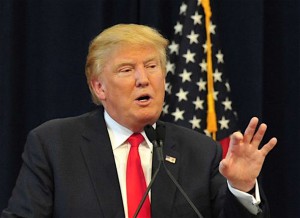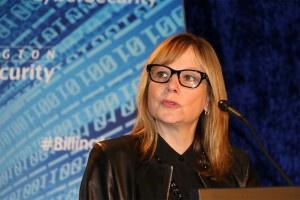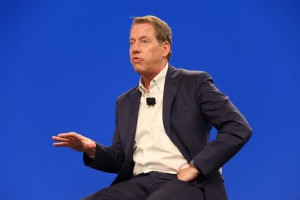
President-elect Donald Trump has been creating quite a buzz during this year's North American International Auto Show.
Forget new product and self-driving cars. The buzz around the North American International Auto Show revolved around President Donald J. Trump’s tweets and claims.
But the automakers were generally digging in their heels and saying they were moving forward with the plans already in the works.
General Motors executives said they automaker planned to go ahead with plans to build the new GMC Terrain unveiled during the auto show in Mexico and Fiat Chrysler Automobiles N.V. chief executive Sergio Marchionne said the company was moving forward with plans to build the Jeep Compass in Mexico.
Joe Hinrichs, president of Ford of the Americas, also said Ford Motor plans to make an investment in the plant in Hermosillo, Mexico, to clear the way for shifting the Ford Focus from the U.S. and Mexico. The shift will allow Ford to clear the plant for as many as three-new truck based vehicles, including the Ford Ranger, Ford Bronco and Ford Expedition. Hinrichs declined to detail the scope of the investment in Hermosillo.
Marchionne also said decision to invest $1 billion was completely divorced from the tweet storms unleased on automaker by President-elect Trump.
(Ford confirms return of Ranger and Bronco. For more, Click Here.)

GM CEO Mary Barra, who serves on an industry forum advising Trump, said the automaker would not be changing its business plans.
As it was Trump tweeted praise for the decision but FCA chief executive officer Sergio Marchionne said during a press conference at the North American International Auto Show that the decision to invest $1 billion in re-tooling a truck assembly plant in Warren, Michigan, and a Jeep plant in Toledo, Ohio, had been made more than year before the official announcement Jan. 8.
“This was totally consistent with what we had announced months ago,” Marchionne said when asked about Trump’s influence on the decision to make major investments in Warren and Toledo. “It wasn’t pre-emptive or anything like that.”
Marchionne, however, also told reporters that the President-elects tweets about jobs and Mexican production could prompt automakers to hold off on some investment decisions until they get a clearer picture of what U.S. policy will be going forward. “We all need clarity,” he said.
Changes to NAFTA could potentially have an adverse impact on the Mexican auto industry, which has been developed to feed product in the U.S. But change in trade policy have always been part of the landscape surrounding the auto industry and carmakers have simply learned to adapt.
The one difference is that Trump is using Twitter as a communication tool, Marchionne said.
Ford Executive Chairman Bill Ford said that he has spoken with Trump several times in the past few months and noted there is ample room for the industry to work with the incoming administration.
“One of the things (Trump) is interested in is lowering the corporate tax rate. That’s something that would help,” Ford told reporters after the Ford press conference.
(Click Here to see Audi redefine luxury.)

Ford Executive Chairman Bill Ford said he speaks with the president-elect on a regular basis, but that Trump doesn't determine the automaker's policies.
“We talk about all kinds of things,” Ford told reporters at the automaker’s press conference at the Detroit auto show. “Trade policies, currency fluctuations, tax policy; all the things that affect our business. I’ve found him to be very informed and very respectful of our position,” he said.
Ford wasn’t the only one striking a conciliatory note regarding Trump.
“We have more in common than we have differences,” GM CEO Mary Barra told journalists in Detroit this week.
“This is a long-lead business with investment decisions made 2, 3, 4 years in advance of when they actually roll out. We are very proud of the very significant – over 100,000 – jobs that we provide in the United States.”
Nonetheless automotive executives and planners from around the world are trying to assess their product and manufacturing plans ahead of the new president’s inauguration later this month.
“I want to wait” to see what policies Trump will actually put in place,” said Dieter Zetsche, CEO of Daimler AG, during a media roundtable at the Detroit Auto Show. He said “what-if” speculation “doesn’t lead anywhere.” But Zetsche also said Daimler and its Mercedes-Benz brand would “have to adjust” to any news rules put in place by the Trump Administration.
Honda officials at the show said they’re also waiting to see what will happen, though they noted that 96% of the vehicles they sold in the U.S. last year were assembled in their dozen American plants. The concern, said John Mendel, Honda’s top American executive, is what any new import barriers might mean for future growth.
(To see the new Honda Odyssey, Click Here.)
The maker’s American factories are already running at capacity and, considering its ongoing growth, it has to consider had to meet future demand. But, Mendel said, “It doesn’t make sense to build another plant here if we have excess capacity elsewhere in the world,” unless U.S. growth can justify adding another plant here.

I keep waiting for the donald to announce plans to bring his manufacturing businesses home. When will that happen?